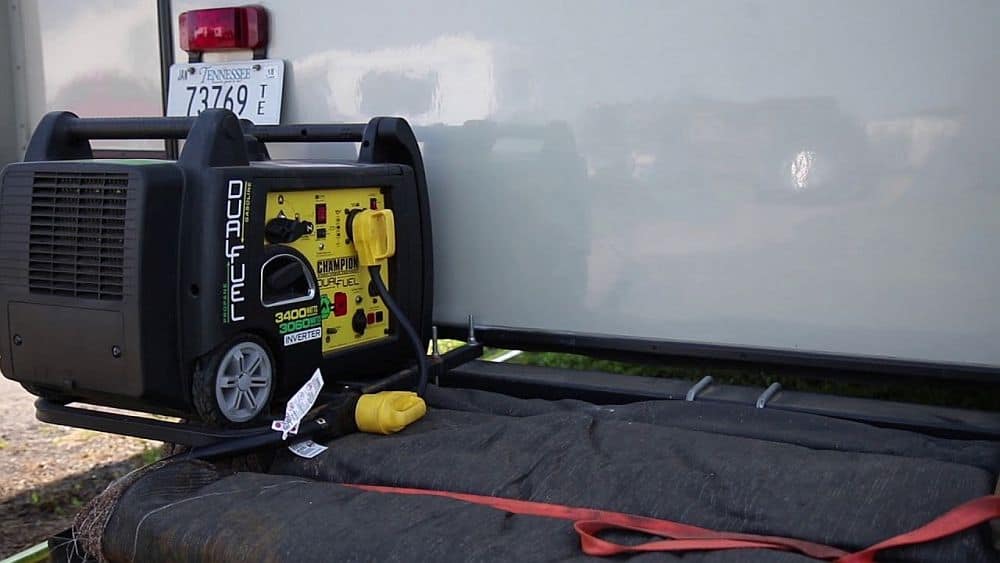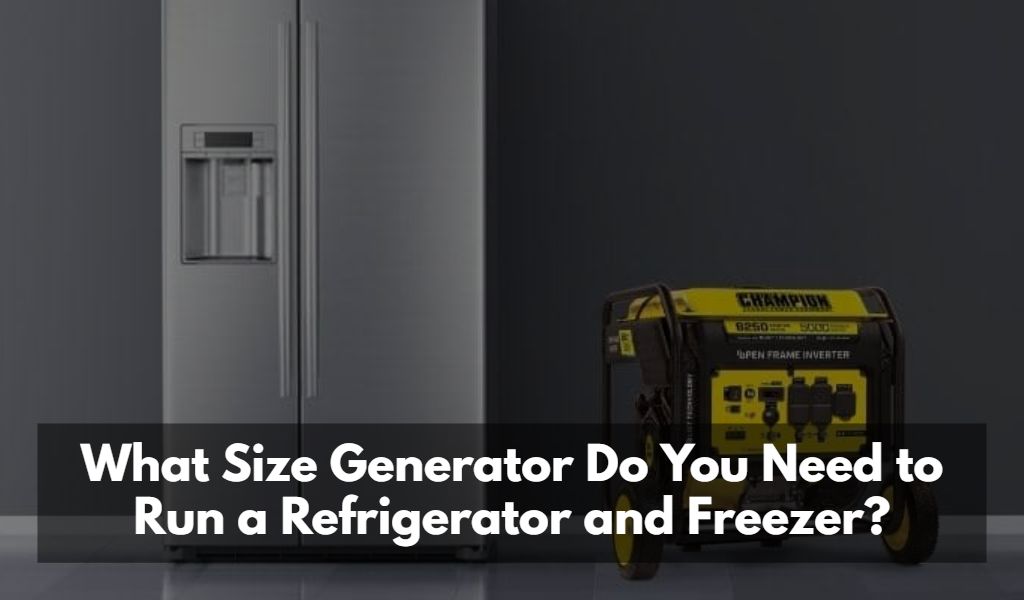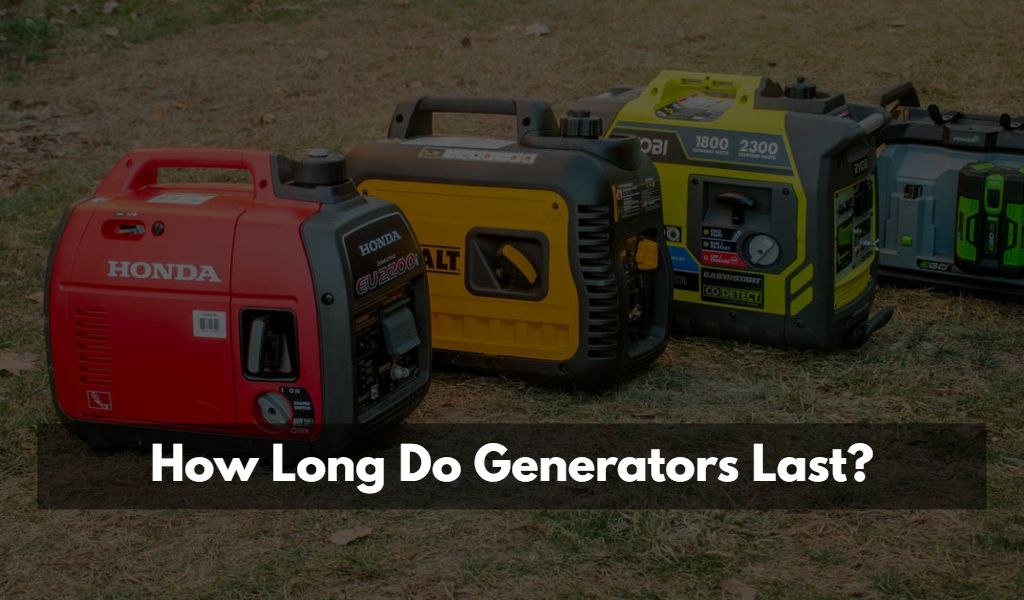Welcome to Generator HQ! Please note that some of the links in our articles are affiliate links. This means if you make a purchase through these links, we may earn a commission at no extra cost to you. These commissions support our work and allow us to continue bringing you valuable content.
Choosing the best quiet generator is tricky.
A noise level of 58 decibels may be high for one but low for another person and people are constantly seeking the quietest generator.
Here is the worst-case scenario for a buyer:
Choosing a quiet generator based on noise level while neglecting its power performance.
Since most manufacturers know you are buying the generator based on one factor, they sacrifice performance because you care less about it.
The good news?
It’s 2019, and you can choose a generator that produces less noise but also performs best. Our top 5 list comprise of generators throwing out immense power in a quiet operation.
But before I get ahead of myself, let me share with you something you need to know about generators. And that is:
Top Recommended Quiet Generators Reviewed
| Image | Product | Noise | Highlighting Feature | Price |
|---|---|---|---|---|
Top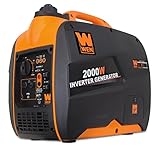 Top
Top
Top
Top | WEN 56200i Super Quiet | 53 dB | A generator offering clean energy and quiet at a decent price | Check Lowest Price |
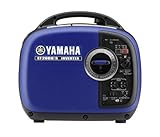 Top
Top
Top
Top | Yamaha EF2000iSv2 | 51.5 dB | A suitcase-style portable generator for tailgating and other recreational activities. | Check Lowest Price |
 Top
Top
Top
Top | DuroMax XP4400E | 69 dB | A heavy-duty generator with a 7.0 horsepower engine ideal for ultimate power at home and recreational activities. | Check Lowest Price |
 Top
Top
Top
Top | Briggs & Stratton 30651 | 59 dB | A compact and lightweight generator ideal for campers and tailgaters | Check Lowest Price |
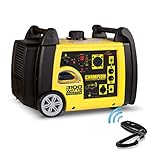 Top
Top
Top
Top | Champion 3100-Watt RV Ready | 58dB | A low decibel inverter generator with a reasonable power output | Check Lowest Price |
Why Are Generators So Noisy?
It’s not secret generators produce lots of noise. And that’s why most people are seeking silent generators.
The noise of a generator depends on so many factors. Here’s are some of the factors affecting the sound:
- The air density
- The exhaust
- The cooling fans
All these three things alter the noise of a generator. For a conventional generator, you will have extra things causing noise. Things like:
- internal fan,
- current instability,
- the friction of various parts,
- mechanical vibrations.
Generators with inverter technology are silent than conventional generators. Since they have a compact design, they use a small engine, which lowers the noise level.
An inverter generator is efficient. That’s because its inverter gen-set produces an electric current.
Besides that, its gen-set body casing lowers the sound. Most inverter generators use insulated sound dampening material that absorbs noise vibration.
That’s why most of these inverter generators have a noise decibel of 10 to 20 than average generators.
Other generators on the market have an acoustic housing that dampens sound, which reduces noise levels.
What Noise Level Should A Silent Generator Have?
Decibel measures the sound. A decibel reading of zero means the threshold of hearing-The lowest sound a human can hear.
For instance, if you are exposed to 160 dBa, it will hurt your eardrums.
In other words, a loud generator is going to have more dBa. Generators differ when it comes to the amount of dBa they produce.
Now to the main question:
How many decibels is a quiet generator supposed to produce?
The most ultra-quiet generator will operate at 50 to 60 dBa or less than that. The best way to know this is to understand the different dBa sound levels. Here’s a table showing you different noise levels.
What Are Some of the Things Making Noise in a Generator?
Noise from a generator comes from two things:
- Engine vibrators
- Exhaust system burning the fuel
The first thing is to install the muffler on your generator. Or make sure the generator you are buying has a high-quality muffler.
Most mufflers can reduce generator noise by 10 to 15 decibels of noise.
If you can’t buy a generator with a muffler, you will need an enormous amount of skill on your part to mount the correct piping and adaptors for a lock-free exhaust.
When shopping for a generator that has the right muffler, second, since vibration causes the noise of a generator.
You need to buy a generator that has sound-dampening material. That way, you will experience less noise when the generator is working.
How Engine Size Affects Noise
The engine size of a generator affects noise. And this a tight rope to balance.
The question you need to ask yourself here is: Do you need a quiet generator, or do you want a generator that will power most of your electrical appliances.
A generator with a large engine capacity, means you are getting more power. And more power means more noise.
Likewise, a generator with a small engine will produce less power. And less power means the generator is quiet.
If you can get a small engine throwing out more power like a conventional generator, then you need to buy it because the quietest generators sacrifices on the engine size.
For instance, a generator producing 5000-watt is louder than a generator producing 1000-watts.
In other words, before you decide on whether you should go for a quiet generator.
You first need to calculate the number of watts of every electrical appliance you will use.
Using those figures, you can know in advance whether you will need a quiet generator or you will have to go with the engine size.
Throttle Control (And How it Affect Noise in a Generator)
A smart throttle control will reduce the noise level in a generator. Conventional generators maintain a constant RPM speed despite their load.
The problem with that is, they become loud and less fuel-efficient. If you have a generator’s engine running at a different output level, it will reduce the noise level.
That said, the generator will always vary the engine speed to run the required capacity.
In other words, when your generator is operating at full capacity, you will have the most noise.
But when you decrease the output level, you will have a quiet running generator.
The critical thing here is choosing a generator that changes its noise level depending on the output and not running at constant RPM speed.
5 Ways to Make A Generator Quiet
A loud generator, even a quiet one is hard to ignore. And noise can be irritating sometimes. The good news is, there are five ways to reduce the noise of the generator. Here are some of the things you need to follow through.
Insulate the enclosure
If you have a generator having an enclosure but still the noise is coming out. You can insulate the enclosure. Doing so creates an extra barrier. There are three options to insulate the enclosure:
- Sound absorbing foam
- Rubber waffle pads
- Sound dampening material
- Acoustic barriers
Doing reduces the noise level. Besides that, placing the rubber waffle pads on the ground and putting the generator on top isolates the vibrations. That’s also something you can do to reduce the noise further.
Build An Enclosure to the Generator
An enclosure housing the generator absorbs and deflects the noise. While doing this, make sure your gen-set gets enough air to burn, airflow to cool, and can get rid of the exhaust.
The second thing is, make sure the exhaust receives enough ventilation. And air circulates freely to prevent overheating.
Above all, the enclosure housing must have enough ventilation. A suitable enclosure will reduce the sound level by 10 decibels.
Extend the distance of Generator
Making a medium distance between your house and the source of noise can help reduce the noise level.
When you increase the distance using a long extension cord, chances are, you will reduce the noise level.
That way, the sound will spread over a large area, and you won’t hear the noise at all.
The rule followed in outdoor open space is:
When you make the distance, you reduce the noise level by 6 decibels.
Besides that, make sure the generator is in a dry and stable place to prevent damage and potential accidents.
Upgrade to An Excellent Exhaust
The exhaust makes a lot of noise in a generator than any other part. When you have a large exhaust pipe, you get additional noise.
That’s why a must for you to upgrade it.
An exhaust is something you can replace with a generator muffler, or if you are mechanical, you can use the car muffler instead.
Attaching the muffler reduces the noise level. Besides that, you will also have to create a custom pipe so you can connect to the exhaust.
Since most exhaust pipes point horizontal, you can expect more noise. Pointing in one direction means more noise.
To minimize the exhaust pipe noise, you can make sure it points vertically so that the sound is directed upwards.
Reviews of the Best Quiet Generator
1. WEN 56200i Super Quiet Generator: Best Overall Quiet Generator
- Dimensions: 18 x 11 x 18 | Weight: 48 lbs
- Noise Level: 53 dB operation
- EPA III and CARB Compliant 79.7 cc 4-stroke OHV engine produces 2000 surge watts and 1600 rated watts
- Great for campgrounds, construction sites, tailgates and power outages
- Produces clean power to safely operate and prevent damage to sensitive electronics such as phones, tablets, televisions and computers
- Includes two three-prong 120V receptacles, one 12V DC receptacle and one 5V USB port
Prices pulled from the Amazon Product Advertising API on:
Product prices and availability are accurate as of the date/time indicated and are subject to change. Any price and availability information displayed on [relevant Amazon Site(s), as applicable] at the time of purchase will apply to the purchase of this product.
At a 1/4 load capacity, the WEN 56200i produces 51dB. These noise levels go up the moment you operate it at a higher capacity. The good news is, the generator is quiet.
Besides that, the generator comes with variable engine speed. Adjusts to keep the noise at bay depending on the load.
The WEN 56200i saves fuel. Its economy mode adjusts the generator’s engine to run the speed that matches the load.
That way, you will reduce fuel consumption and lower the noise levels. That said, the eco-mode only works if you operate the generator below 1000 watts.
A single fuel of gallon will last you up to 4 hours if you are operating at full capacity. When you run the generator at a 50% capacity, it will get you up to 5 hours.
The WEN 56200i generator uses a 79.7cc 4-stroke engine and a forced cooling system.
Read full review of Wen 56200i
Pros
- Quiet engine
- Fuel efficient
- Decent price
Cons
- Short run time
2. YAMAHA EF2000I5V2 Inverter Generator: Best Runner’s Up
- 1600 watt rated AC output, 2000 watt maximum AC output, 13.3/16.7 amps @ 120V
- Super-quiet muffler with USFS-approved spark arrestor - 51.5 dBA at 1/4 load
- Smart Throttle varies engine speed based on load - improves fuel economy and reduces noise
- Inverter system with Pulse Width Modulation (PWM) control
- CARB Compli
Prices pulled from the Amazon Product Advertising API on:
Product prices and availability are accurate as of the date/time indicated and are subject to change. Any price and availability information displayed on [relevant Amazon Site(s), as applicable] at the time of purchase will apply to the purchase of this product.
Yamaha EF200015V2 has a coolest-looking design. Well, the retro-inspired design looks excellent for camping and tailgating setup.
The design is compact, and the generator is light. At 44 pounds, this generator is super light thanks to the ergonomic carry handle and wheels.
The generator runs on a 1.1-gallon fuel tank and a smart throttle control adjusts it depending on the load capacity.
The generator features a molded casing with noise-absorbing glass wool. They help in dampening noise in heavy operation.
The noise reduction in rubber feet ensures smooth and quiet operation using the generator.
Its decibel rating comes in at 51.5 dBa at 1/4 load, and when it is running at full capacity, it is 61dBa.
The Yamaha comes with 1600watts of running power and 2000 starting watts. The Yamaha runs for 10.5 hours at 25% of the load.
Well, this possible because the generator uses smart throttle load features. At only 44 pounds, the Yamaha is the lightest portable generator in our list.
Pros
- Quiet Operation
- Light
- Decent design
Cons
- Expensive
- Not enough power for heavy-duty appliances
3. DuroMax XP4400E : Best Cheap
- Your purchase includes One DuroMax XP4400E 4400 watt 7-Hp RV Grade Gas Generator with Electric Start, One oil funnel, One spark plug wrench, tools set, wheels and handle kit, DC charging cables and owner’s manual
- Portable Generator dimensions: 24” L x 17 W x 17 H. Product weight: 127 lbs
- Specifications: Noise level – 69 dB. Fuel tank capacity (GASOLINE) – 3.96 gallons
- Run your generator with Gasoline for long lasting power.
- With 4,400 starting watts and 3,500 running watts, this unit can handle heavy loads from lights and a refrigerator to a home air conditioner and high amperage power tools. Operate at both 120 V and 240 V simultaneously, or at 120 only with full po
Prices pulled from the Amazon Product Advertising API on:
Product prices and availability are accurate as of the date/time indicated and are subject to change. Any price and availability information displayed on [relevant Amazon Site(s), as applicable] at the time of purchase will apply to the purchase of this product.
The noise level of Duromax is under 69bB. A rating that goes hand in hand with a 7.0 horsepower 4-stroke OHV engine enclosed with its heavy-duty steel frame roll cage.
The 7HP 4-stroke OHV engine provides plenty of power. Its forced air-cooling system prevents the engine from heating up. The Duromax XP4400E delivers 3500 watts of running power and 4400 watts of starting strength.
The Duromax enormous power is enough to control the lights, fridge, and a sump pump in the event of a blackout.
But that’s not all.
This power can make sure all your heavy-duty appliances run efficiently at home or recreational purposes like the 13500BTU AC.
Since it has immense power, you can use it to run the saws and drills. Its gas tank can hold 4 gallons of fuel that will keep the generator running for 8 hours (at 50% load).
At 50% load which is 1800w, the generator can last for 14 hours for recoil starting and 12 hours for electric starting.
If you need to trap water, there’s a fuel filter cup in the fuel tank. With a fuel filter cup, you’ll drain away from the full container for storage.
Unlike most generators, this is an EPA compliant that you can use in California and U.S national park.
The most outstanding feature is the electric key start. All you need is to turn the key, and it runs, it’s like turning your car’s ignition key.
A convenient feature in Duromax XP4400e is the wheels and a flip-up, stow-away handle. The machine is heavy, but it has handles and wheels, you can transport it with ease.
You can read the Duromax XP4400e Review here.
Pros
- Reliable
- Easy to start
- Easy to maintain
Cons
- Heavy
4. Briggs and Stratton 30561- P2200: Best Quiet Generator for the Money
- Quiet and fuel efficient 111 cc OHV engine produces 2,200 starting watts and 1700 running watts
- USB port allows charging of portable electronics in order to stay connected. Muffler : Super Lo-tone. Start type: Recoil
- Produces less than 3% total harmonic distortion making it safe for laptop computers, TVs and game systems
- 1-gallon fuel tank for up to 6.5 hours of continuous operation at 25% load
- Parallel connector port allows connection between 2 units for more power
- Quiet and fuel efficient 111 cc OHV engine produces 2,200 starting watts and 1700 running watts
- Produces less than 3 percent total harmonic distortion making it safe for laptop computers, TVs and game systems; Run Time Upto 8.0 at 25 percent Load
- 1 gallon fuel tank for Upto 8 hours of continuous operation at 25 percent load, USB port allows charging of portable electronics in order to stay connected
- Parallel connector port allows connection between 2 units for more power; Muffler : Super Lo Tone. Start Type : Recoil
- At 59 decibels operating volume, it’s quieter than a normal conversation (Sound levels may vary based on proximity and location; measured at ¼ load at 7 meters from control panel side)
- Can not be shipped to the state of Califor
Prices pulled from the Amazon Product Advertising API on:
Product prices and availability are accurate as of the date/time indicated and are subject to change. Any price and availability information displayed on [relevant Amazon Site(s), as applicable] at the time of purchase will apply to the purchase of this product.
Briggs and Stratton deliver 2,200 starting watts and 1,700 running watts for consistent power output and safe operation.
At 54lbs, the Brigg and Stratton is super light and if you can love with it anywhere around.
On the noise side, the model produces a volume of 59dB. That’s super quiet than most generators. It may also never distract you from a conversation with your friends.
The control panel has various outlets that allow users to plug in multiple devices and electrical appliances. Some of these outlets include:
- DC
- 120-volt
- A USB adapter
When the generator is operating at 1/4 load, you can run this generator for 8 hours. The P2200 features a standard recoil pull start.
The best feature this generator has is its control center housing everything needed for you to operate the generator.
Safety is something this generator was built for, and you’ll see it has three power reset buttons and one main reset button.
With its three LED indicator, you’ll be informed about the current status of the generator:
- First light shows a generator is operating well
- The second light shows there is an overload
- The third light indicates there’s something wrong
Pros
- Easy to use
- Simple control panel
Cons
- No fuel gauge
5. Champion Power Equipment 755371
- Dual Fuel – Operate your 3400-watt portable generator right out of the box on either gasoline or propane, plus the unit holds 0.6-quarts of oil (recommended 10W-30) and has a low oil shut-off sensor
- Convenient Electric Start with 3-Position Ignition Switch – Battery included, plus Quick Touch Panel allows you to access all your controls in one spot.Noise Level :59 dBA at 23 feet. Frequency 60 Hz
- Ultra-Quiet Operation – 59 dBA is perfect for RVs, tailgating, your next project or backup power for your home, featuring 3400 starting watts and 3100 running watts with up to 7.5 hours run time on gasoline
- Clean Power for Sensitive Electronics – RV Ready with a 120V 30A RV, plus two 120V 20A household outlets with clean electricity (less than 3% THD) and 12V DC outlet with dual USB adapter
- Champion Support – Includes 3-year limited warranty with FREE lifetime technical support from dedicated expe
Prices pulled from the Amazon Product Advertising API on:
Product prices and availability are accurate as of the date/time indicated and are subject to change. Any price and availability information displayed on [relevant Amazon Site(s), as applicable] at the time of purchase will apply to the purchase of this product.
The Champion power equipment performs well to meet your needs. It is a popular power generator that costs less than Honda and Yamaha inverter generator, giving out the same power needs.
The Champions delivers 3500-watts starting power and 2800 watts running wattage. With this power, rest assured you have enough to fulfill most of your RV needs.
If you compare this generator to its predecessor, you’ll find the predecessor has 1700 running watts and lack the ability of a parallel connection.
The parallel connection allows you to stack the unit and also give you an extra outlet to power any heavy-duty equipment you may have.
So what kind of things can you use with this kind of power?
With 3100 starting watts and 2800 watts, you can power most electrical appliances and devices in the event of outages.
Electrical appliances that can use it included- lights, refrigerator, sump pump, wifi, routers, and many more.
The generator produces 58dBa from 23 feet. At this level, it is louder than EF200iSV2.
That’s because it has a 171 cc engine which is twice the 1000- and 2000-watt inverter engine producing the same power.
The Champion has a 4-stroke engine that runs reliably and gives out efficient heat for long-time fuel consumption.
Its runtime varies and depends on the load. In other words, if you have a heavy load, the runtime will be short. With the help of an economical switch, the engine will slow down when the load is not heavy.
The generator is a bit heavy, and with its carrying handles and wheels, you will be in a position to move around with it.
Pros
- Quiet operation
- Fuel efficient
Cons
- Too heavy
FAQ About Quiet Generators
What happens if I operate my generator at a low load most of the time?
If you operate the generator at a low load (in this case less than ¼ capacity), the generator’s performance will decline over time.
That means reducing its lifespan and you will have to be on the market to buy a new one.
The best solution is to make sure you sometimes operate the generator higher than 50 percent load.
Can I use my generator with an extension cord?
Of course, you can do that. One thing you have to remember is a long cord causes a drop-in voltage.
The voltage will drop by 2 to 3 volts if you have a 10-meter cord. The number of volts doubles as you increase the distance.
Does a generator cause carbon monoxide poisoning?
The engine exhaust of a generator emits carbon monoxide. This is a poisonous gas that kills in seconds. It comes with no smell, no color, and no taste.
That’s why it is essential to use a generator outside and away from windows, doors, and vents. Most importantly, you need to make sure the engine exhaust is directed outside.
If you want to use the generator well, make sure you read the manual. Sometimes, you can install carbon monoxide sensors in your home. These sensors can alert you in case, the oxygen level in your home is low.
Check generator safety tips we have.
Our Top Pick for The Best Quiet Generator
Assuming you have figured out the proper size generator you need, picking a quiet generator is not an easy thing because you also have to consider performance.
A quiet generator needs to power most of your electrical appliances at home besides reducing its noise level. That’s why you need to balance quietness and performance when choosing a generator.
Unless you want something super quiet, then you will have to sacrifice performance if you will use a few electrical appliances.
From our research, tests, and interviews, we feel and know WEN 56200i is the generator having a great balance of noise and performance. Besides that, this best quiet generator will save you fuel during operation.
Best Quiet Generators Compared
| Image | Product | Noise | Highlighting Feature | Price |
|---|---|---|---|---|
Top Top
Top
Top
Top | WEN 56200i Super Quiet | 53 dB | A generator offering clean energy and quiet at a decent price | Check Lowest Price |
 Top
Top
Top
Top | Yamaha EF2000iSv2 | 51.5 dB | A suitcase-style portable generator for tailgating and other recreational activities. | Check Lowest Price |
 Top
Top
Top
Top | DuroMax XP4400E | 69 dB | A heavy-duty generator with a 7.0 horsepower engine ideal for ultimate power at home and recreational activities. | Check Lowest Price |
 Top
Top
Top
Top | Briggs & Stratton 30651 | 59 dB | A compact and lightweight generator ideal for campers and tailgaters | Check Lowest Price |
 Top
Top
Top
Top | Champion 3100-Watt RV Ready | 58dB | A low decibel inverter generator with a reasonable power output | Check Lowest Price |

